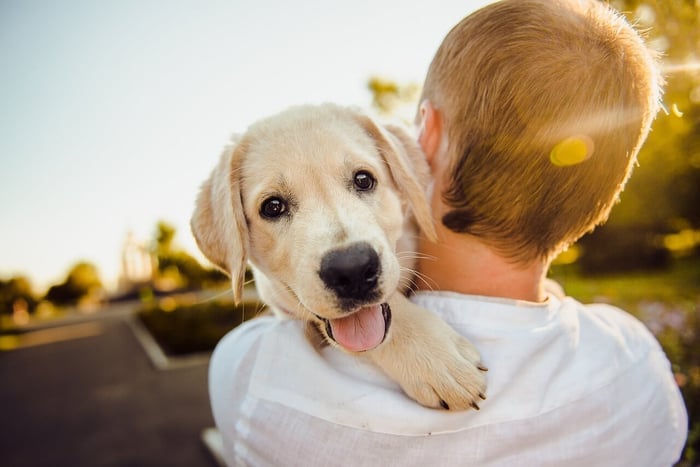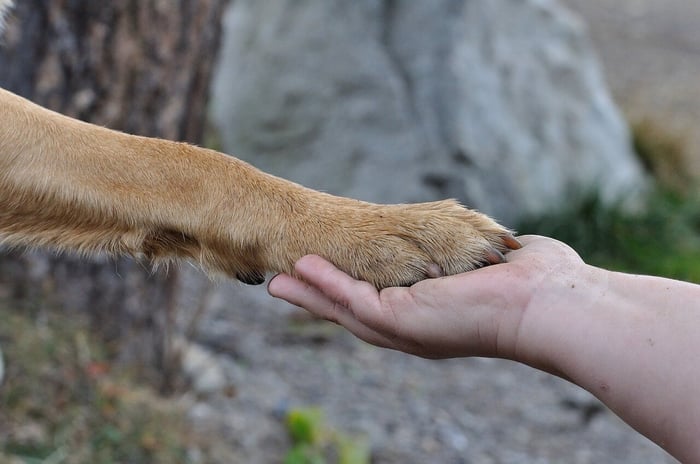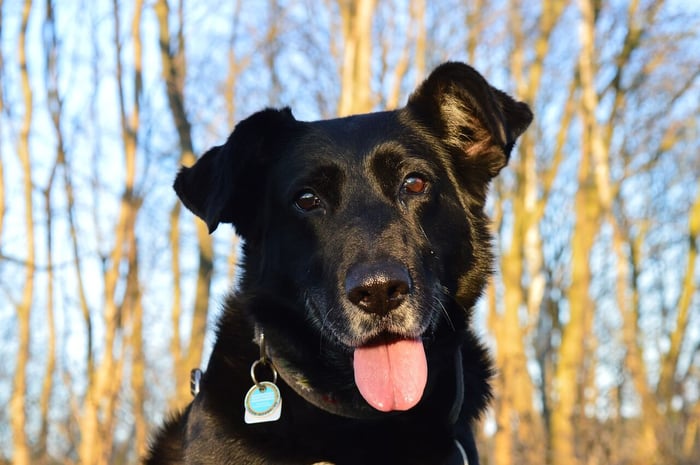The age-old question of every dog lover: "Is my furry friend truly happy?" We all want our four-legged friends to have happy lives full of tail wags, cheerful barks, and lively frolics. However, reading their conduct isn't always as simple as we'd want. If you've ever wondered about this, you've come to the correct place. Let's look at the universal indicators of a happy dog.

Universal Signs of a Happy Dog
Dogs, much like us humans, have a myriad of ways to show their emotions. From the ecstatic wagging of a tail to a contented sigh, our dogs communicate with us constantly. And while each breed might have its quirks (we're looking at you, Labrador Retriever and Golden Retriever with your endless enthusiasm!), there are some universal signs that your dog is in good spirits.
Relaxed Body Language: A content dog will often have a relaxed posture. Their ears will be in a neutral position, not pinned back or overly perked. Their eyes will be soft and bright, not wide and alarmed.
Tail Wagging: Yes, the most obvious one! But did you know the way they wag their tail matters? A relaxed, side-to-side tail wag suggests a happy dog. However, a rigid tail held high or wagging just at the tip might indicate agitation.
Playfulness: Ever wondered, why dogs chase their tails or why dogs love snow so much? It's all in good fun! A playful demeanor, whether they're chasing after their own tail or joyfully bounding in the snow, often signals a cheerful pup.
Seeking Your Company: Dogs are pack animals, and if yours follows you around like, well, a puppy, it's a sign they're content being with you. So, next time you wonder why my dog follows me, take it as a compliment!
Good Appetite and Sleep Patterns: A happy dog often has a healthy appetite and sleep schedule. If you notice your dog skipping meals or wondering why dogs sleep so much, it might be worth considering their overall well-being.
Breed-Specific Tells
All dogs possess traits and behaviors that can serve as indicators of their happiness. By familiarizing ourselves with the characteristics of dog breeds we can acquire a more profound comprehension of what brings joy to our beloved pets.
Labrador Retriever: Renowned for their exuberance, Labrador Retrievers wear their hearts on their furry sleeves. A happy Lab is likely to greet you with not just a wagging tail but their entire body wiggling in excitement! Their joy is also evident when they're fetching toys or playing with kids.
Golden Retriever: Much like their Labrador cousins, Golden Retrievers are expressive creatures. Their soft, amber eyes almost seem to smile when they're content. A Golden will often seek physical closeness, leaning into you or placing a paw on your lap, signaling trust and contentment.
French Bulldog: With their distinctive bat ears and soulful eyes, French Bulldogs have taken the world by storm. A joyful Frenchie might display happiness with playful "zoomies" around the house or a spirited game of tug. Their expressive face, often filled with mischief, is a sign they're having a good time.
Poodle: Elegance and intelligence define the Poodle. But don't be fooled by their poised demeanor; Poodles have a goofy side too. A content Poodle will often engage in clever games, showcase tricks, or even "talk" to you with a series of unique vocalizations.
Beagle: These compact scent hounds are curious by nature. A cheerful Beagle is always ready for an olfactory adventure, nose to the ground, and tail wagging vigorously. Their melodious bark and howl, especially when they're on the scent trail, is another indicator of their happiness.

Understanding Quirky Dog Behaviors
Every dog owner has had those moments when they've wondered about the curious and sometimes baffling behaviors of their furry friend. Why do they tilt their heads when we speak? Why the obsession with rolling around in the most... aromatic things they can find? Let's unravel some of these canine enigmas.
The Classic Head Tilt: Few things are as endearing as a dog tilting its head, appearing deeply contemplative. While the exact reason isn't universally agreed upon, many experts believe dogs do this to hone in on certain sounds or to get a better view of our facial expressions.
The Peculiar Stare: Ever had that feeling of being watched and turned around to find your dog's eyes fixed on you? It's not just a sign of their attentiveness; often, it's a form of bonding. Dogs are experts at reading our facial cues, and they gain valuable information from our expressions.
Rolling Extravaganza: Ah, the age-old mystery of why dogs seem to love rolling around in things – especially those that smell less than pleasant to us. This behavior can be traced back to their wild ancestors, who would roll in different scents to mask their own, either for hunting or for protection.
Snowy Frolics: Many dogs, regardless of breed, exhibit sheer joy when presented with a snowy landscape. But why do dogs love snow so much? Some theories suggest the change in texture and temperature is stimulating, while others believe it's the novel scents snow can bring.
Tail Chasing Antics: It might seem amusing (or concerning) to watch your dog chase its tail, but it's a behavior as old as time. While often playful in nature, excessive tail chasing might indicate underlying issues.
The Curious Scoot: If you've noticed your dog scooting on the ground, it might be more than just a peculiar quirk. It could indicate an issue with their anal glands or potential irritants.
The Happiness-Health Connection
A content tail wag and joyful bark is signs of a happy dog, but ensuring your canine companion's well-being goes beyond understanding their quirks. A dog's physical health and mental stimulation play pivotal roles in their overall happiness. Let's discuss some vital areas of dog wellness to ensure our four-legged pals are always at their best.
Diet and Nutrition: Just like us, what dogs eat greatly affects how they feel. It's crucial to provide a balanced diet tailored to their age, breed, and health requirements. If your dog has been refusing food or seems less enthusiastic during meal times, it's essential to discern the root cause.
Regular Health Check-ups: Routine veterinary visits help spot potential health issues before they escalate. Moreover, understanding the general health markers, like how often puppies pee or the average lifespan of a dog, can provide valuable context about your dog's well-being.
Dental Care: Many dog owners overlook the importance of their pet's dental hygiene. Regularly brushing your dog's teeth can prevent dental diseases and ensure their chompers stay strong and healthy.
Physical Exercise and Mental Stimulation: Every breed and individual dog has its exercise needs. While some dogs, like the energetic Labrador, may require rigorous play and long walks, others might be content with short strolls and indoor games. Don't forget about mental stimulation either; dog training offers both mental challenges and reinforces the bond between pet and owner.
Safe Outdoor Adventures: Whether it's teaching them how to swim or ensuring they're secure during a hiking expedition here, safety should always be a priority. These experiences can be joyous for dogs, but it's our responsibility to ensure they're always protected.
Proper Grooming: Regular baths, depending on your dog's breed and lifestyle, help keep their coat shiny and skin healthy.
Conclusion
At the heart of every wagging tail, playful bark, and contented sigh is a dog that feels loved, secure, and cherished. Our exploration, into recognizing the indicators of a content canine giving priority to their choosing accessories and acknowledging the significance of training highlights a core reality; our dedication to our furry friends greatly influences their overall happiness.
Every dog, be it the ever-loyal Labrador, the vivacious Poodle, or the spirited Beagle, brings a unique blend of joy, love, and sometimes mischief into our lives. Their joy often stems from the connection they have, with their companions and the surroundings in which they flourish.
Reference:
https://www.akc.org/expert-advice/lifestyle/how-do-i-know-if-my-dog-is-happy/
https://funnyfuzzy.com/a/blog/how-cold-is-too-cold-for-dogs
https://funnyfuzzy.com/a/blog/how-to-express-your-dogs-anal-glands-safely











